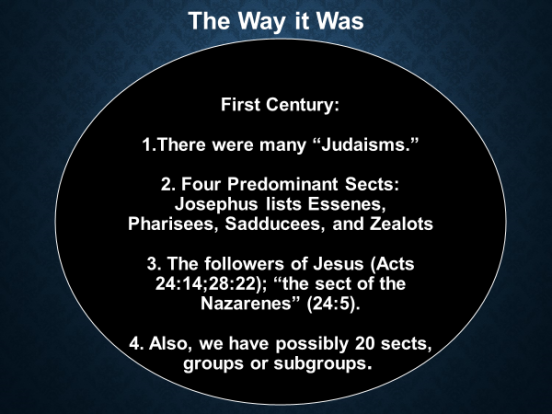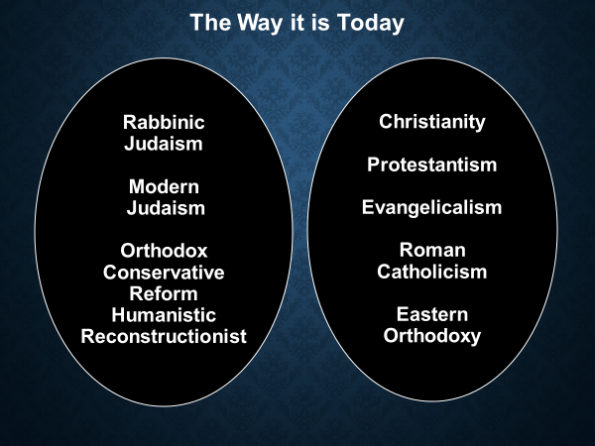
Editor’s note: This post originally appeared on Think Apologetics. Tabernacle of David considers this resource trustworthy and Biblically sound.
.
Over the years, I have seen Muslims and even Jewish anti-missionaries attempt to pit Paul and Jesus against each other. The argument sometimes go like this: “Jesus was devout, Torah observant Jew, but Paul came along and perverted his teachings and founded a new religion called ‘Christianity.’” Or, skeptics say the Gospels can’t give us any reliable information about Jesus and Paul can’t be trusted as well. Thus, the assumption is made that Paul created a heavenly Jesus which has no relationship to any earthly Jesus.
I have dealt with this objection here.
But even more importantly, so many Christians assume Jesus came into the world and ended Judaism and brought a brand new religion called Christianity. Sometimes when Christians say Christianity is a fulfillment of Judaism, that can lead one to assume Jesus brought a new religion called Christianity which means Judaism came to an end. Granted, when we say the word “Judaism” we have to define what we mean. Most Christians think in terms of religions. Thus, we have Judaism and Christianity. For that matter, modern Jewish people tend to follow this line of thinking as well.But this leads to some major historical challenges. In my experience, paradigms play a huge role in this issue. Ronald Timothy says:
“Paradigms can be so strong they act as psychological filters – we quite literally see the world through our paradigms. Any data that exists in the real world (or even in the Bible) that does not fit our paradigm will have a difficult time getting through our filters. We are quite literally unable to perceive the facts right before our eyes. Thus, our greatest strengths can become our greatest weakness by not allowing us to see both the need and the opportunity for change. The people who create new paradigms are usually outsiders. They are not part of the established paradigm community.“– Ronald Timothy, Following Jesus: Our Cruciform Example
Let’s look at some of the paradigms that play a huge role in forming our conclusions on this topic:
Linguistically speaking, Christianity didn’t exist in the first century. Judaism in the first century wasn’t seen as a single “way.” There were many “Judaisms”- the Sadducees, the Pharisees, Essenes, Zealots, etc. The followers of Jesus are referred to as a “sect” (Acts 24:14;28:22); “the sect of the Nazarenes” (24:5). Josephus refers to the “sects” of Essenes, Pharisees, Sadducees. The first followers of Jesus were considered to be a sect of Second Temple Judaism. Even James Dunn says the following:
“Prior to Paul what we now call ‘Christianity’ was no more than a messianic sect within first-century Judaism, or better, within Second Temple Judaism — ‘the sect of the Nazarenes’ (Acts 24.5), the followers of ‘the Way’ (that is, presumably, the way shown by Jesus)”- James Dunn, Jesus, Paul and the Gospels, pg 119.
Paradigm Problem #2: The Old Testament is about Judaism/law/legalism, and the New Testament is about Christianity (grace and love).
Walter Kaiser sums up the problem here:
“God never intended that the two testaments should result in two separate religions: Judaism and Christianity. The Tanach (= OT) was meant to lead directly into the so-called New Testament and thus be the continuation of one plan from creation to consummation. When the divine promise-plan of God is ruptured and divided into two distinct parts, with the climax triumphing over the earlier revelation, then we have introduced a division where God had revealed the fulfillment of what he had revealed in earlier texts! Therefore, we must investigate further how this disparity appeared among the people of God”- Walter Kaiser, Jewish Christianity: Why Believing Jews and Gentiles Parted Ways in the Early Church
Paradigm Problem #3: Christians Perception of Judaism and Jewish Things:
Another reason Christians assume Jesus ended Judaism as a religion is because of two factors:
1.Fear of Judaizing: Christians read Galatians and assume Paul is against all Jewish things because he is correcting the Jewish believers who thought Gentiles had to be circumcised. But this is a total misunderstanding.
2. The Pharisees: Another common assumption is that Jesus is against Judaism because of his disputes with the Pharisees. But in reality, Jesus actually had more in common with the Pharisees than one may think. The Pharisees were the most influential sect of the Jews and their first characteristic is that they are devoted to the Torah (Law), to its interpretation, and to living life as closely as possible according to the Torah. The Pharisees believed in the resurrection of the dead (Acts 23:8). In Jesus’ time most of the scribes were Pharisees, but not all Pharisees had the theological skill demanded of a scribe.
James Charlesworth notes the following:
“Was Jesus an Essene, Pharisee, Zealot, or Sadducee? This question also is now exposed as uninformed. Jesus was certainly no Zealot or Sadducee. He was close in many ways to the Essenes and especially some Pharisees; but he was neither an Essene nor a Pharisee. Jesus was influenced by some Essene ideas and many Pharisaic thoughts, but he was not an Essene or Pharisee—let alone a Zealot or Sadducee. He was unique and gave rise to a new Jewish sect.” – James H. Charlesworth, The Historical Jesus: An Essential Guide (Essential Guides)
Paradigm Problem #4: Christian know very little about Jesus and his desire to restore Israel.
As Craig Evans says:
But we must ask if Paul has created a new institution, a new organization, something that stands over against Israel, something that Jesus himself never anticipated. From time to time learned tomes and popular books have asserted that the Christian church is largely Paul’s creation, that Jesus himself never intended for such a thing to emerge. Frankly, I think the hypothesis of Paul as creator of the church or inventor of Christianity is too simplistic. A solution that is fairer to the sources, both Christian and Jewish, is more complicated. -Evans, Craig A., From Jesus to the Church: The First Christian Generation.
Take a look at both quotes from Evans in this post. From my own experience, most Christians and Jewish people like the current boundaries. In other words, we have two separate religions, Judaism and Christianity. Thus, we don’t care much about as to how we got to that place. One thing for sure: If we discuss the “imperial Christianity” that was legalized in the fourth century by Constantine and whether Jesus or Paul is the founder of that, the answer is no. By then, the Christianity that existed was so far away from what Jesus and Paul had done, it had morphed into a new and separate religion. Here are a couple of pictures to help summarize where we are today:
If you want to see some of the complex factors that led to Christianity and Judaism becoming two separate religions, see the book, Partings: How Judaism & Christianity Became Two.
Note: If upon reading this post, you’re having a major case of cognitive dissonance, that’s okay!




